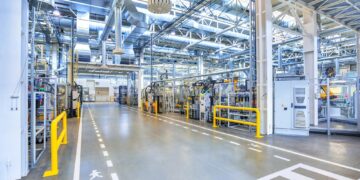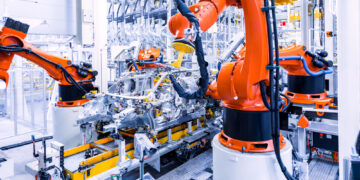Saudi Arabia has set its sights on a revolutionary transformation, embracing the advanced technological era known as the Fourth Industrial Revolution. With the unveiling of its Vision 2030 on April 25, 2016, the nation is focused on diversifying its economy and propelling societal progress through strategic initiatives such as the National Industrial Development and Logistics Program (NIDLP).
This ambitious program is designed to foster growth in key sectors, attract foreign investment, and integrate Industry 4.0 technologies into various industries. Saudi Arabia is strategically positioned to become a central hub for this industrial revolution by leveraging its ample energy resources and its geographic location at the intersection of Asia, Europe, and Africa.
The Kingdom is taking concrete steps towards building a dynamic knowledge-based economy. As a G20 country, it champions an environment conducive to entrepreneurship and technological breakthroughs. This is evidenced by the creation of innovation centers, incubators, and research facilities that support the development of pioneering solutions.
For instance, initiatives such as the Saudi Venture Capital Company, the King Abdullah University of Science and Technology, and the King Abdulaziz City for Science and Technology are driving innovation across various sectors. Saudi Arabia is empowering its younger generation and workforce to seize the opportunities of the Fourth Industrial Revolution and contribute to national prosperity.
The adoption of advanced manufacturing and supply chain technologies like artificial intelligence (AI), predictive analytics, automation, Internet of Things (IoT), and robotics is poised to increase efficiency and meet growing domestic demand. According to Harsh Kumar, a co-founder of Shipsy, supportive policies, investment in education, and global tech partnerships are essential for this transformation.
International collaborations are anticipated to bring in best practices and customized solutions, establishing Saudi Arabia as a leader in technological advancement and supply chain excellence in the region. The Kingdom’s impressive digital infrastructure, including a 98 percent internet penetration rate among its over 32 million citizens, sets the stage for significant advancements.
E-commerce in Saudi Arabia, projected to surpass $13 billion by 2025, offers substantial opportunities for improving logistics operations with AI. Additionally, a government initiative aims to bolster the digital skills of 100,000 students by 2030. Kumar notes the direct correlation between GDP and supply chain efficiency, underscoring the importance of resilient logistics networks across manufacturing, trade, retail, and other industries.
Advanced technologies are expected to reduce costs, promote sustainability, enhance customer service, and boost Saudi Arabia’s competitiveness on the global stage. The Global Machinery & Equipment Report 2024 by Bain & Co. highlights the significant productivity gains, ranging from 30 to 50 percent, that machinery and equipment manufacturers can achieve by leveraging AI, lean methodologies, and sustainability innovations.
Many executives in the machinery sector view AI adoption as a pressing matter, with 75 percent considering it a top priority in their research and development efforts. In the context of Saudi Arabia’s industrial sector, the digitalization and automation of supply chain operations are seen as pivotal for enhancing efficiency and spurring innovation.
Saudi Arabia’s dedication to Vision 2030 lays a robust foundation for embracing Industry 4.0, positioning it as a pioneer of technological progress in the Middle East.
Harsh Kumar, Chief Strategy Officer and Co-founder of Shipsy
Additional opportunities include the development of smart factories, the burgeoning e-commerce sector, advanced data integration, and increased competitiveness through technologies like AI and IoT. As AI continues to flourish, investment in workforce skills, cybersecurity, and data protection policies are also expected to rise.
The Kingdom’s commitment to Vision 2030 is building a solid base for adopting Industry 4.0, making it a regional technology leader. Saudi Arabia’s industrial companies are rapidly adopting advanced analytics and data-driven decision-making, realizing benefits in productivity, cost savings, risk management, and preparedness for unforeseen events.
Under Vision 2030, Saudi Arabia plans to invest $20 billion in AI by 2030 to grow its digital sector. A report by PwC suggests that AI’s economic impact in the Middle East could reach $320 billion by 2030, with Saudi Arabia potentially accounting for $135.2 billion of this figure and experiencing one of the fastest growth rates in the region.
Kumar believes that Saudi Arabia’s aspirations to lead in Industry 4.0 technologies and innovation have substantial geopolitical and economic implications. NEOM, a $500 billion future city, exemplifies the nation’s strides towards becoming a hub for innovation and economic diversification. Moreover, projects like the Saudi Genome Program, the Al-Khafji Desalination Plant, and the National Biotechnology Strategy reaffirm Saudi Arabia’s commitment to advancing technology and sustainable development.
As the Ministry of Industry and Mineral Resources in Saudi Arabia continues to develop strategies to enhance the adoption of digital technologies and AI, initiatives like the ‘Future Factories’ program aim to upgrade thousands of facilities with the latest manufacturing technologies. The National Productivity Program by MODON is another example of efforts to improve production efficiency in small and medium-sized industrial enterprises.
By utilizing the Smart Industry Readiness Index, endorsed by the World Economic Forum, Saudi Arabia is assessing and enhancing the smart maturity of its factories and identifying transformation priorities. Overall, the Kingdom’s journey towards embracing digital technologies and AI in its industries is well underway, with Vision 2030 leading the path to a prosperous and innovative future.









